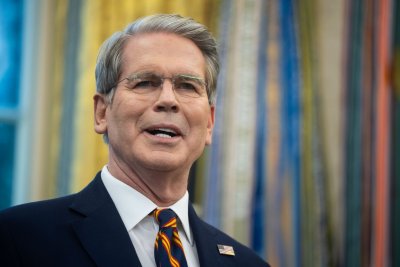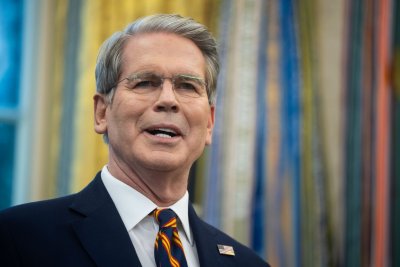
Oct. 10 (UPI) — The United States has sanctioned more than 50 people, entities and vessels accused of facilitating the sale of Iranian oil and liquefied petroleum gas, as the Trump administration continues to tighten its financial vise on Tehran.
The sanctions target nearly two dozen shipping vessels, a China-based crude oil terminal and a Chinese so-called teapot refinery that the Treasury accuses of moving hundreds of millions of dollars’ worth of LPG for Iran.
The Treasury said that Shandong Jincheng Petrochemical Group, an independent teapot refinery in Shandong Province, has purchased millions of barrels of Iranian oil since 2023, receiving the shipments worth hundreds of millions of dollars via Iran’s shadow fleet of vessels.
The China-based Rizhao Shihua Crude Oil Terminal was also blacklisted for accepting more than a dozen of those shadow fleet ships.
“The Treasury Department is degrading Iran’s cash flow by dismantling key elements of Iran’s energy export machine,” Treasury Secretary Scott Bessent said in a statement.
“Under President [Donald] Trump, this administration is disrupting the regime’s ability to fund terrorist groups that threaten the United States.”
The sanctions are the fourth round of the second Trump administration to target China-based refiners accused of purchasing Iranian oil and follow the U.S. blacklisting of facilitators of Iran’s oil trade on Aug. 22 and a network of dozens of individuals, entities and vessels that make up Tehran’s shipping network on July 30.
The sanctions continue the Trump administration’s maximum pressure campaign that failed during his first term to bring Iran to the negotiating table on a new deal.
The punitive policy was initially launched in 2018, when Trump withdrew the United States from a landmark multinational Obama-era accord aimed at preventing Iran from securing a nuclear weapon as part of efforts to cobble together one of his own.
The maximum pressure campaign of sanctions and other measures was employed in an effort to compel Iran to resume negotiations on a new deal.
Instead, Iran continued to advance its nuclear program.
The previous Biden administration attempted to restart negotiations with Iran on reinstating the Joint Comprehensive Plan of Action, but those prospects were dashed when Iran-backed Hamas attacked Israel on Oct. 7, 2023.
The second iteration of the maximum pressure campaign was launched on Feb. 4 with Trump’s signing of National Security Presidential Memorandum 2, which seeks to “impose maximum pressure on the Iranian regime to end its nuclear threat, curtail its ballistic missile program and stop its support for terrorist groups.”
The policy’s second iteration is a broader focus on China’s aid to Iran, secondary sanctions and a targeting of Tehran’s shadow fleet
The sanctions announced Thursday coincided with the Treasury also sanctioning a network of individuals and companies assisting Iran with evading U.S. sanctions.
It also blacklisted 44 individuals and firms accused of being involved in Iran’s nuclear program and weapons procurement network earlier this month.
